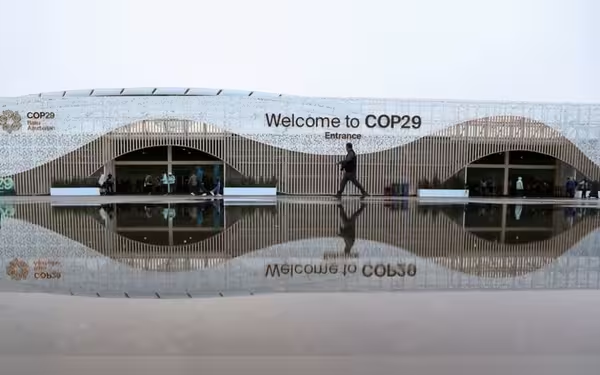Saturday, November 16, 2024 05:45 PM
Climate Leaders Demand Reform of COP Talks in Baku
- COP climate talks deemed ineffective by experts.
- Urgent call for action on renewable energy.
- Disagreements overshadow opening day of summit.
 Image Credits: channelnewsasia
Image Credits: channelnewsasiaClimate leaders at COP talks in Baku call for urgent reforms to address climate change effectively.
In recent years, the annual UN COP climate talks have become a focal point for global discussions on climate change. These meetings bring together nearly 200 countries to negotiate and set targets aimed at combating the pressing issue of climate change. However, as the latest summit unfolds in Baku, Azerbaijan, a group of former leaders and climate experts has raised serious concerns about the effectiveness of these talks. They argue that the COP process is no longer fit for purpose and requires significant reform.
The current summit aims to establish a new financial target to assist developing countries in adapting to climate change and recovering from severe weather events. Yet, the opening day of the conference was marred by disagreements over the agenda, highlighting the challenges that delegates face. Compounding these issues are uncertainties regarding the United States' commitment to climate action under a potential Donald Trump presidency, as well as diplomatic tensions involving the host nation and the unexpected withdrawal of the Argentinian delegation.
In a critical open letter released on November 15, more than 20 experts, including notable figures such as former UNFCCC head Christiana Figueres and former UN Secretary-General Ban Ki-moon, expressed their discontent with the current COP structure. They stated, "It is now clear that the COP is no longer fit for purpose. Its current structure simply cannot deliver the change at exponential speed and scale, which is essential to ensure a safe climate landing for humanity." This statement underscores the urgency for a fundamental overhaul of the COP process.
The letter advocates for a shift from mere negotiations to actual implementation of climate commitments. The signatories emphasize the need for the COP to facilitate the urgent transition to renewable energy sources and the phase-out of fossil fuels. This call for action reflects a growing sentiment among climate leaders that the time for talk has passed; now is the moment for decisive action.
As the world grapples with the realities of climate change, the effectiveness of international negotiations becomes increasingly critical. The COP talks have historically played a vital role in uniting nations to address this global crisis. However, without significant reforms, the ability of these talks to produce meaningful outcomes may be severely compromised. It is essential for all stakeholders to recognize the urgency of the situation and work collaboratively towards a sustainable future. The path forward must prioritize action over dialogue, ensuring that commitments translate into tangible results for the planet and its inhabitants.













